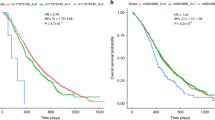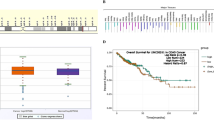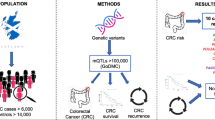Abstract
Previously we have localized to chromosome 3q21–q24, a predisposition locus for colorectal cancer (CRC), through a genome-wide linkage screen (GWLS) of 69 families without familial adenomatous polyposis or hereditary non-polyposis CRC. To further investigate Mendelian susceptibility to CRC, we extended our screen to include a further GWLS of an additional 34 CRC families. We also searched for a disease gene at 3q21–q24 by linkage disequilibrium mapping in 620 familial CRC cases and 960 controls by genotyping 1676 tagging SNPs and sequencing 30 candidate genes from the region. Linkage analysis was conducted using the Affymetrix 10K SNP array. Data from both GWLSs were pooled and multipoint linkage statistics computed. The maximum NPL score (3.01; P=0.0013) across all families was at 3q22, maximal evidence for linkage coming from families segregating rectal CRC. The same genomic position also yielded the highest multipoint heterogeneity LOD (HLOD) score under a dominant model (HLOD=2.79; P=0.00034), with an estimated 43% of families linked. In the case–control analysis, the strongest association was obtained at rs698675 (P=0.0029), but this was not significant after adjusting for multiple testing. Analysis of candidate gene mapping to the region of maximal linkage on 3q22 failed to identify a causal mutation. There was no evidence for linkage to the previously reported 9q CRC locus (NPL=0.95, P=0.23; HLODdominant=0.40, HLODrecessive=0.20). Our findings are consistent with the hypothesis that variation at 3q22 contributes to the risk of CRC, but this is unlikely to be mediated through a restricted set of alleles.
Similar content being viewed by others
Log in or create a free account to read this content
Gain free access to this article, as well as selected content from this journal and more on nature.com
or
References
Johns LE, Houlston RS : A systematic review and meta-analysis of familial colorectal cancer risk. Am J Gastroenterol 2001; 96: 2992–3003.
Aaltonen L, Johns L, Jarvinen H, Mecklin JP, Houlston R : Explaining the familial colorectal cancer risk associated with mismatch repair (MMR)-deficient and MMR-stable tumors. Clin Cancer Res 2007; 13: 356–361.
Bonaiti-Pellie C : Genetic risk factors in colorectal cancer. Eur J Cancer Prev 1999; 8 (Suppl 1): S27–S32.
Peel DJ, Ziogas A, Fox EA et al: Characterization of hereditary nonpolyposis colorectal cancer families from a population-based series of cases. J Natl Cancer Inst 2000; 92: 1517–1522.
Kemp Z, Carvajal-Carmona L, Spain S et al: Evidence for a colorectal cancer susceptibility locus on chromosome 3q21–q24 from a high-density SNP genome-wide linkage scan. Hum Mol Genet 2006; 15: 2903–2910.
Wiesner GL, Daley D, Lewis S et al: A subset of familial colorectal neoplasia kindreds linked to chromosome 9q22.2–31.2. Proc Natl Acad Sci USA 2003; 100: 12961–12965.
Skoglund J, Djureinovic T, Zhou XL et al: Linkage analysis in a large Swedish family supports the presence of a susceptibility locus for adenoma and colorectal cancer on chromosome 9q22.32–31.1. J Med Genet 2006; 43: e7.
Kemp ZE, Carvajal-Carmona LG, Barclay E et al: Evidence of linkage to chromosome 9q22.33 in colorectal cancer kindreds from the United Kingdom. Cancer Res 2006; 66: 5003–5006.
Abecasis GR, Cherny SS, Cookson WO, Cardon LR : Merlin – rapid analysis of dense genetic maps using sparse gene flow trees. Nat Genet 2002; 30: 97–101.
Boyles AL, Scott WK, Martin ER et al: Linkage disequilibrium inflates type I error rates in multipoint linkage analysis when parental genotypes are missing. Hum Hered 2005; 59: 220–227.
Webb EL, Sellick GS, Houlston RS : SNPLINK: multipoint linkage analysis of densely distributed SNP data incorporating automated linkage disequilibrium removal. Bioinformatics 2005; 21: 3060–3061.
Gudbjartsson DF, Jonasson K, Frigge ML, Kong A : Allegro, a new computer program for multipoint linkage analysis. Nat Genet 2000; 25: 12–13.
Chen CD, Yen MF, Wang WM, Wong JM, Chen TH : A case–cohort study for the disease natural history of adenoma-carcinoma and de novo carcinoma and surveillance of colon and rectum after polypectomy: implication for efficacy of colonoscopy. Br J Cancer 2003; 88: 1866–1873.
Faraway JJ : Distribution of the admixture test for the detection of linkage under heterogeneity. Genet Epidemiol 1993; 10: 75–83.
Risch N : Linkage strategies for genetically complex traits. I. Multilocus models. Am J Hum Genet 1990; 46: 222–228.
Adie EA, Adams RR, Evans KL, Porteous DJ, Pickard BS : SUSPECTS: enabling fast and effective prioritization of positional candidates. Bioinformatics 2006; 22: 773–774.
Djureinovic T, Skoglund J, Vandrovcova J et al: A genome wide linkage analysis in Swedish families with hereditary non-familial adenomatous polyposis/non-hereditary non-polyposis colorectal cancer. Gut 2006; 55: 362–366.
Daley D, Lewis S, Platzer P et al: Identification of susceptibility genes for cancer in a genome-wide scan: results from the colon neoplasia sibling study. Am J Hum Genet 2008; 82: 723–736.
Jaeger EE, Woodford-Richens KL, Lockett M et al: An ancestral Ashkenazi haplotype at the HMPS/CRAC1 locus on 15q13–q14 is associated with hereditary mixed polyposis syndrome. Am J Hum Genet 2003; 72: 1261–1267.
Nakajima K, Ota H, Zhang MX et al: Expression of gastric gland mucous cell-type mucin in normal and neoplastic human tissues. J Histochem Cytochem 2003; 51: 1689–1698.
Acknowledgements
We are grateful to the patients, their families and their clinicians for their participation in this study. The CORGI Consortium comprised Lucy Side, Lucy Curtis and Peter Risby (Oxford Regional Genetics Service, Churchill Hospital, Oxford, UK), Carole Cummings and Angela Brady (North-West Thames Regional Genetics Service, Northwick Park Hospital, Harrow, UK), Joan Paterson (Anglia Regional Genetics Service, Addenbrooke's Hospital, Cambridge, UK), Shirley Hodgson and Tessa Homfray (South-West Thames Regional Genetics Service, St George's Hospital, Tooting, London, UK), Louise Izatt (South-East Thames Regional Genetics Service, Guy's Hospital, London, UK), Alan Donaldson (South-West Regional Genetics Service, Bristol, UK), Patrick Morrison (Northern Ireland Regional Genetics Service, City Hospital, Belfast, UK), Carole Brewer (South-West Regional Genetics Service, Royal Devon and Exeter Hospital, Exeter, UK), John Burn and Alison Trainer (Northern Regional Genetics Service, International Centre for Life, Newcastle, UK), Rosemarie Davidson and Victoria Murday (West of Scotland Regional Genetics Service, Yorkhill Hospital, Glasgow, UK), Jaqueline Cook (Sheffield Regional Genetics Service, Children's Hospital, Sheffield, UK), Neva Haites (North of Scotland Regional Genetics Service, Foresterhill Hospital, Aberdeen, UK), Eamonn Sheridan (Yorkshire Regional Genetics Service, St James's Hospital, Leeds, UK), Andrew Green (Republic of Ireland Genetics Service, Our Lady's Hospital for Sick Children, Dublin, Republic of Ireland) and Susan Ritchie (Nottingham Centre for Medical Genetics, City Hospital, Nottingham, UK), who should be regarded as co-authors of this work. The work was supported by grants from Cancer Research UK. ZK was funded by the EU, GS by Leukemia Research, EP by the Institute of Cancer Research and SS by CORE. Finally, work of the German HNPCC consortium is supported by German Cancer Aid.
Author information
Authors and Affiliations
Consortia
Corresponding authors
Additional information
Web addrresses
URLs for programs and data presented herein are as follows:
Online Mendelian Inheritance in Man (OMIM): http://www.ncbi.nlm.nih.gov/sites/entrez
SUSPECTS: http://www.genetics.med.ed.ac.uk/suspects/
dbSNP: http://www.ncbi.nlm.nih.gov/sites/entrez
UCSC Human Genome browser, http://genome.ucsc.edu/cgi-bin/hgGateway
Affymetrix NetAffx: http://www.affymetrix.com/analysis/index.affx
Illumina: http://www.illumina.com/
SNPLINK: http://www.icr.ac.uk/cancgen/molgen/MolPopGen_Bioinformatics.htm
R suite of programs: http://www.r-project.org/
Conflict of interest
The authors state no conflict of interest.
Supplementary Information accompanies the paper on European Journal of Human Genetics website (http://www.nature.com/ejhg)
Rights and permissions
About this article
Cite this article
Papaemmanuil, E., Carvajal-Carmona, L., Sellick, G. et al. Deciphering the genetics of hereditary non-syndromic colorectal cancer. Eur J Hum Genet 16, 1477–1486 (2008). https://doi.org/10.1038/ejhg.2008.129
Received:
Revised:
Accepted:
Published:
Issue date:
DOI: https://doi.org/10.1038/ejhg.2008.129
Keywords
This article is cited by
-
Molecular Analysis of Iranian Colorectal Cancer Patients at Risk for Lynch Syndrome: a New Molecular, Clinicopathological Feature
Journal of Gastrointestinal Cancer (2015)
-
Genome-wide linkage analysis and tumoral characterization reveal heterogeneity in familial colorectal cancer type X
Journal of Gastroenterology (2015)
-
Germline mutations affecting the proofreading domains of POLE and POLD1 predispose to colorectal adenomas and carcinomas
Nature Genetics (2013)
-
Evidence of linkage to chromosomes 10p15.3–p15.1, 14q24.3–q31.1 and 9q33.3–q34.3 in non-syndromic colorectal cancer families
European Journal of Human Genetics (2012)
-
Hereditary mixed polyposis syndrome is caused by a 40-kb upstream duplication that leads to increased and ectopic expression of the BMP antagonist GREM1
Nature Genetics (2012)



